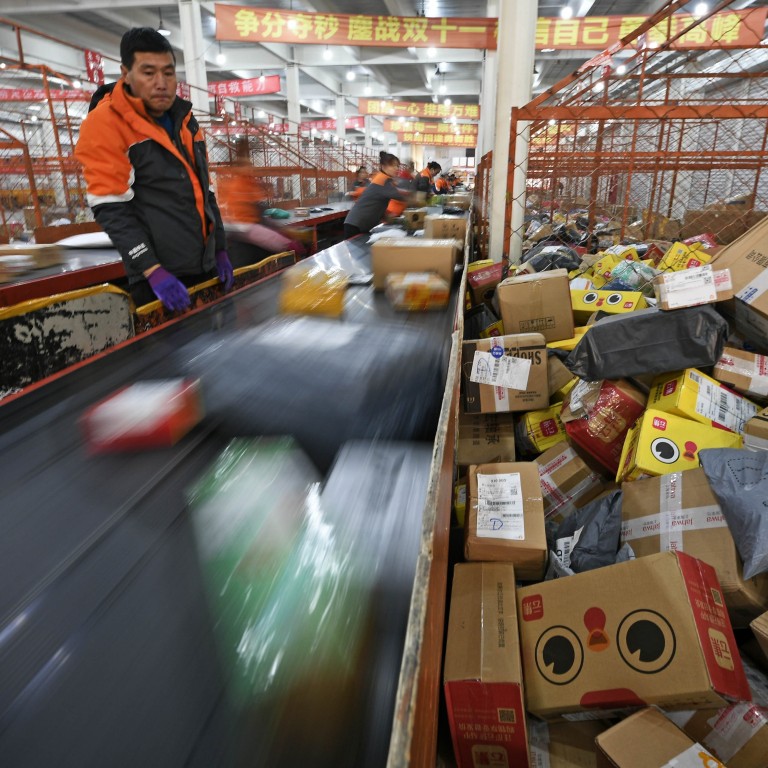
Here’s how China’s new e-commerce law will affect consumers, platform operators
- E-commerce platform operators are jointly liable with merchants for selling counterfeit and copycat merchandise on their websites
China’s comprehensive e-commerce law, which was passed in August, takes effect on January 1, bringing increased pressure on online retail companies to fight the sale of counterfeit and copycat merchandise on their platforms.
It covers the requirement for registration and licensing of e-commerce operators, taxation, electronic payment and e-commerce dispute resolution, as well as the protection of intellectual property, according to a post by Hong Kong-based law firm Deacons.
The law comes amid the rapid development of China into the world’s largest e-commerce market, with US$1.53 trillion in sales last year, estimates by research firm eMarketer show.
That expansion has largely been led by Alibaba Group Holding, through its Chinese retail platforms Taobao Marketplace and Tmall, and rival JD.com. New York-listed Alibaba is the parent company of the South China Morning Post.
The new law, which aims to help clean up China’s reputation as a major source of counterfeit and knock-off merchandise, also addresses other important aspects of e-commerce, including false advertising, consumer protection, data protection and cybersecurity, according to Deacons.
While large operators, such as Alibaba and JD.com, have the capabilities to comply with the wide-ranging law’s requirements, small e-commerce operators with fewer resources may be put at a disadvantage, which could hinder the growth of these players in the domestic market.
What kinds of e-commerce operators are covered by the new law?
The new law will apply to three types of operators. These include e-commerce platform operators like Taobao, third-party merchants who sell goods and services on the e-commerce platform of others, and online vendors operating their own websites or which do business via other network channels, such as social media sites.
The addition of non-traditional e-commerce platforms means that merchants who sell goods through the Moments feed of Tencent Holdings’ WeChat social messaging service or ByteDance video-sharing app Tik Tok – known as Douyin on the mainland – fall under the new law. These sellers will now need to file their business registration and pay the relevant taxes.
How will the law affect China’s e-commerce players?
It now makes all e-commerce platform operators jointly liable with the merchants for selling any counterfeit or copycat merchandise goods on their website. Previously, individual merchants were solely liable when caught selling fake or knock-off goods.
So a platform operator becomes liable if it knows, or should know, that a merchant on its website has violated intellectual property rights and fails to take action, such as deleting, blocking links or stopping transactions, according to Deacons.
That puts the onus on the large e-commerce platform operators like Alibaba, JD.com and Pinduoduo to better police online sales.
Alibaba and Pinduoduo have previously come under fire for allowing the sale of counterfeit or inferior copycat products on their marketplaces. Both companies have taken a strong stance of fighting fake goods on their platform, through a variety of measures that include using artificial intelligence to identify potential counterfeit listings, taking these down and penalising merchants.
Under the new law, operators can be fined up to 2 million yuan (US$290,780) in serious cases of intellectual property infringement.
Platform operators are also prohibited from imposing unreasonable restrictions, conditions or fees on merchants. In addition, these operators must keep transaction records, as well information of products and services provided, for at least three years.
How will consumers benefit from the new law?
It improves the protection to consumers, as merchants must clearly disclose any bundles or clauses they have placed on each sale.
Should goods and services provided on an e-commerce platform violate the rights and interests of consumers, the operator will be jointly liable with the vendor if it did not take the necessary measures to remedy the situation and protect its customers.

